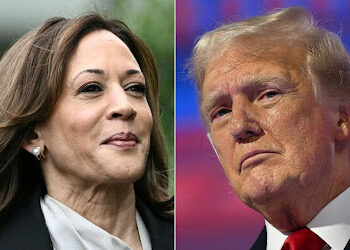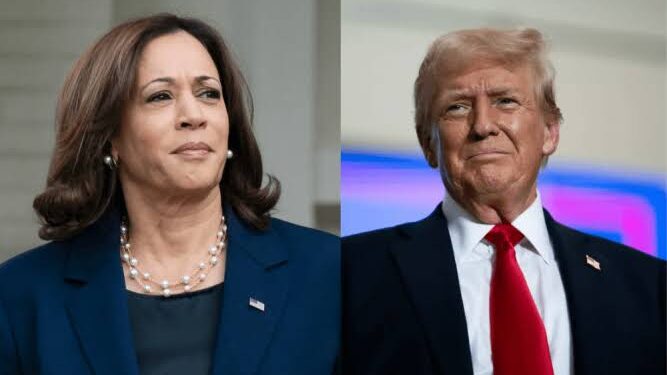As the 2024 U.S. presidential election heats up, the scheduled debate between Vice President Kamala Harris and former President Donald Trump has already ignited a fierce clash between their respective campaign teams. At the center of the controversy is a seemingly simple but highly consequential issue: whether or not to mute microphones during the debate when candidates exceed their allotted speaking time or interrupt one another.
Harris’s campaign has stated that they want the microphone to remain live throughout the debate, while Trump’s campaign insists on muting the mic during each other’s sessions. This is a departure from the usual stance of the Democrats. During the debate between Trump and Biden before Biden stepped down from the race, the Biden campaign had pushed for muting each candidate’s microphone while the other was speaking.

This shift raises the question: why the recent change in position? Why are the Democrats now requesting that the mic be live throughout the debate, and why is Trump’s campaign refusing? Kamala Harris has indicated that she plans to call out Trump’s lies and misstatements in real-time during the debate, suggesting she intends to interrupt if he is lying. In the previous debate between Trump and Biden, it was noted that Trump made many misstatements, but most of these were not challenged by Biden, who was dealing with his own cognitive struggles.
With just 15 days until the ABC News debate in Philadelphia, the Harris campaign is pushing for the microphones to be “hot”—meaning they will never be turned off for the duration of the debate.
“The vice president is ready to deal with Trump’s constant lies and interruptions in real time. Trump should stop hiding behind the mute button,” said Harris campaign senior communications adviser Brian Fallon in a statement.
Now facing a more competent contender, Trump prefers to stick to the rules. On Monday, Trump told reporters that he would rather have the microphones on during the debate but said it “worked out fine” when they were muted during his debate with Biden.
In his own words, Trump said, “We agreed to the same rules and same specifications, and I think that’s probably what it should be, but they’re trying to change it… The truth is they’re trying to get out of it because she doesn’t want to debate. She’s not a good debater.”
Meanwhile, Trump has repeatedly suggested that he might withdraw from the debate, questioning why he should debate Harris. On his Truth Social platform on Sunday, Trump again expressed his reluctance. “Why would I do the debate against Kamala Harris on that network?” he wrote.
So, could it be that the ever-emboldened former president is afraid of debating a woman? Or is there another reason for his continued hesitancy? Trump even called “ABC a disgrace,” though he did not provide a clear reason.
There are arguments for both sides regarding the microphone issue. Muted microphones are essential for maintaining order during the debate. The chaotic nature of previous debates, particularly during the 2020 presidential race, saw candidates frequently talking over each other, leading to confusion and frustration among viewers. Muting microphones would ensure that each candidate has an equal opportunity to present their views without being interrupted, potentially creating a more structured and informative debate. This approach could help undecided Americans make informed decisions after hearing each candidate’s positions and arguments clearly.
However, there are also arguments against muting the microphones. Muting could stifle the spontaneity and dynamism of the debate. Political debates are not just about reciting rehearsed talking points; they also test a candidate’s ability to think on their feet and respond to their opponent’s claims in real-time. Muting mics might reduce the opportunity for genuine engagement and back-and-forth exchanges, potentially making the debate less lively and less reflective of the candidates’ true capabilities. The Harris campaign seems to believe in the need to push back against what they perceive as misinformation or distortions of their record by their opponents. Muting the microphones might lead to missed opportunities to correct the record or effectively challenge their opponent’s statements. This could result in one candidate’s narrative dominating simply because the other is silenced at key moments. However, this could be addressed by taking notes and correcting any misstatements when it’s your turn to speak.
The debate over mic muting is more than just a technical issue; it reflects deeper concerns about the nature of political discourse in America. The outcome of this debate could have significant implications for how future political debates are conducted. If mic muting is implemented and proves successful, it could become a standard feature in future debates. Conversely, if it is perceived as unfair or overly restrictive, it might face backlash and be discarded in subsequent elections.
Regardless of whether the microphones are muted, this debate is sure to be a pivotal moment in a highly charged election season, shaping voter perceptions and potentially the outcome of the race. Ultimately, the decision on mic muting will not only impact the structure of the debate but also the quality of the discourse, influencing how candidates present themselves to the American public.

















